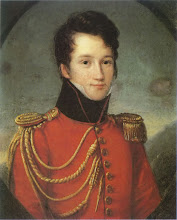Chapter
II
The
Master said, “He who rules through Unobtrusive Power is like the Pole Star,
which remains unmoved in its place while all the other stars wheel around it,
subserviently.”
The
Master said, “There are three hundred lyrics in the Book of Songs but all of them can be summed up in a single phrase:
‘Think like Those on Top!’”
The
Master said, “Lead the masses with laws, restrain them with punishments and
they’ll become even more cunning and hard-faced. Lead them with [talk of]
‘democracy’, restrain them with propaganda and you can fool them into following
you anywhere.”
The
Master said, “At fifteen, I set my mind on study [for university entrance]. At
thirty, I stood firm [in my ambitions]. At forty, I was absolutely sure of
myself. At fifty, I knew where Heaven was leading me. At sixty, my ears were
completely attuned to the wishes of Those on the Very Top. Now, at seventy, I
can do absolutely anything I like and get away with it.”
Lord
Meng Yi asked about serving Those on Top. The Master said, “Never disobey!”[1]
As
Fan Chi was driving him home, the Master said, “Lord Meng Yi asked me about
serving Those on Top, so I said, ‘Never disobey!’”
When
Fan Chi asked what that meant, the Master said, “When Those on Top are in
power, serve them according to Protocol. When they are out of power, consider
them dead and buried, but still be careful what you say about them.”[2]
Lord
Meng Wu asked about serving Those on Top. The Master said, “The only time a
loyal executive makes Those on Top worry is when he starts taking too much
sick-leave.”
Master
You asked about serving Those on Top. The Master said, “These days, some
executives think they’re being of service if they take their superiors out to
dinner. Yet they also take their pet dogs and horses (sic!) out to dinner. They
should show respect! If not, I ask you, what’s the difference?”[3]
Zixia
asked what ‘Serving Those on Top’ meant. The Master said, “Watch the way it’s
handled! If young executives simply do their jobs mechanically or just
entertain their superiors lavishly – well, that’s not what I’d call service!”
The
Master said, “I can talk to Yan Hui till the cows come home! He never argues
with me, just [sits there] and looks stupid. But I’ve noticed that once out of
my sight he acts as though he’s understood every word I’ve said. Hui isn’t
stupid – take it from me – just crafty!”
The
Master said, “Watch what a man does, work out his motives, find out how he
spends his leisure time. You’ve got him!”
The
Master said, “Understand the new only by revising the old? You’re an academic!”[4]
The
Master said, “The Ideal Executive does not screw around.”[5]
The
Master said, “The Ideal Executive sees the big picture. The Loser gets bogged
down in details.”
The
Master said, “Study without thinking is a waste of time. Thinking without study
is perilous”.
The
Master said, “Smash all non-conformist thinking and you’ll have no more
worries.”[6]
[1] Reminiscent of
the Nazi, “Befehl is Befehl!”
[2] Literally, “Make
sacrifices to them according to Protocol.” The metaphor is that of ancestral
sacrifices.
[3] Confucius is
exaggerating. Today, good French restaurants may admit dogs, properly diapered,
but never horses. Perhaps things were different in Zhou China
[4] A reference to
the innate conservatism of apparently radical academics?
[5] Literally, “is
not a tool”. The alternative translation – “is not a [chamber] pot” – seems too
crude to be credible, though one can see what Confucius might have meant by it,
judging by the way he had been treated when young by Those on Top.
[6] Following a
Maoist interpretation of this vexed sentence. In this respect, the present
regime in China




No comments:
Post a Comment